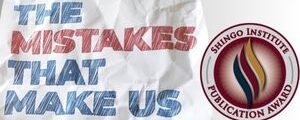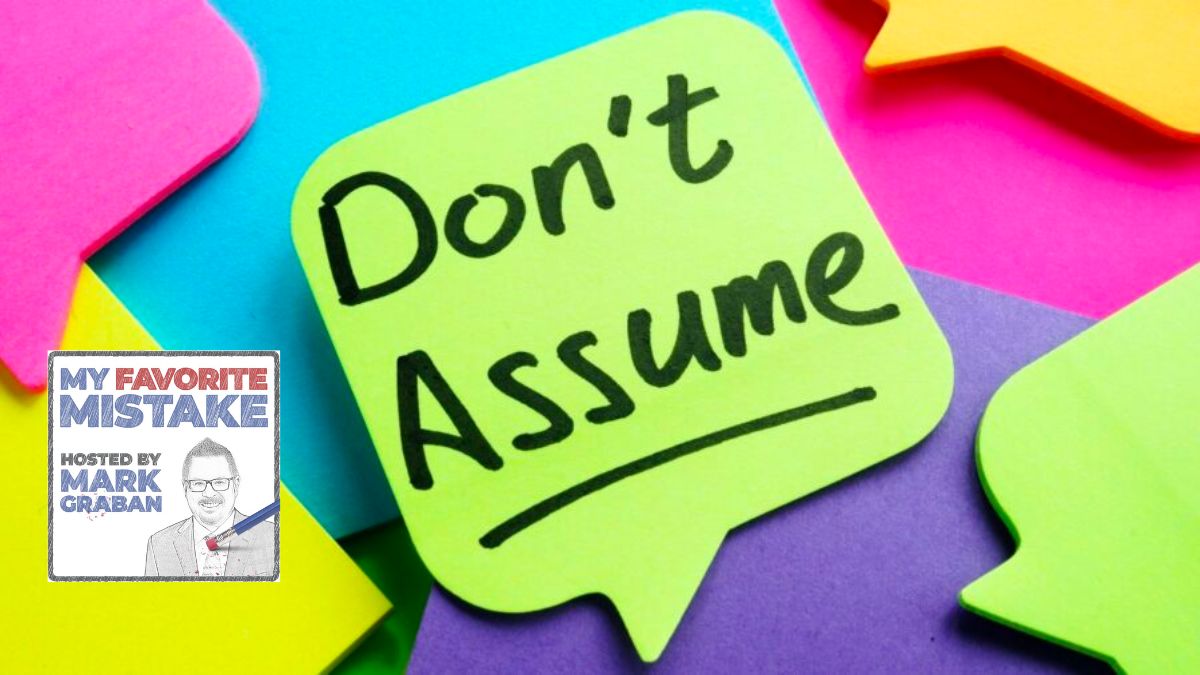In “The Mistakes That Make Us: Cultivating a Culture of Learning and Innovation,” we delve into the powerful and often untold stories of prominent figures who have turned their mistakes into stepping stones for success.
Mistakes, as Oprah Winfrey eloquently puts it, are not just errors but directional cues from life itself, guiding us towards new paths and possibilities. This blog post explores the intriguing journeys of individuals who have faced their failures head-on, learned from them, and emerged stronger. From the pitfalls of assumptions to the lessons learned in the throes of failure, these narratives shed light on the transformative power of mistakes. Join us as we uncover how each misstep, when embraced with reflection and resilience, becomes a vital ingredient in the recipe for personal and professional growth.
This material was cut from the book The Mistakes That Make Us: Cultivating a Culture of Learning and Innovation.
Why Do We Make Mistakes?
“Being human means you will make mistakes. And you will make mistakes, because failure is God’s way of moving you in another direction.” — Oprah Winfrey
Why do we make mistakes? Because we’re human.
OK, end of story. Thanks for reading.
Slips, or execution mistakes, are easier to explain, as they can be caused by all sorts of human fallibilities, such as fatigue, distraction, and sloppiness. Even at our best, we’re going to make mistakes.
Planning mistakes are based on decisions we make — the best we can do at a certain time.
Guests have shared their My Favorite Mistake stories centered around a decision (or a series of decisions) that seemed like the right decision at the time. Once we see a mistake, it might be caused by:
- Bad assumptions
- Bad information
- Incomplete information
- Not listening to others
- Listening to the wrong people
- Not listening to yourself
- Expecting that past performance will guarantee future results
We might base a decision based on bad information. But, even if we have all the needed information, our cognitive biases might still trip us up — there we go ahead, being human.
Bad Assumptions
Many of my guests shared stories where the root of the mistake was a bad assumption. An assumption often replaces knowledge or facts and can be a dangerous substitute. We sometimes have to work from assumptions, but it’s helpful to distinguish what we know from what we are assuming. We’re better off stating our assumptions as such so that we can test (and prove or possibly disprove) the assumption(s), and perhaps prevent a mistake (or making a small mistake instead of a large one).
Breaking Stereotypes: Leslie Tayne’s Journey from Gender Assumptions to Empowered Success
Leslie Tayne is an award-winning financial attorney and author of Life and Debt. Her favorite mistake was the assumption she made when starting her first law firm over 20 years ago. Leslie approached a male classmate and asked him to partner with her for the sole reason (her assumption) that she needed a man because the legal industry was male-dominated.
She recognized her mistake within two months as she learned they didn’t share the same vision and values. Leslie moved quickly to dissolve the partnership and went out on her own as a woman, learning that other factors mattered more than gender — and she was indeed successful without a male partner.
It wasn’t an overnight decision; it might have been a mistake to act too rashly, but it certainly would have been a mistake to keep that relationship going out of fear of admitting a mistake.
Learning from Failure: How Gene Rice’s Mistakes in the Music Club Business Propelled His Success in Executive Search”
Today, Gene Rice is chairman and co-founder of Rice Cohen International and has been recognized as one of the top executive search professionals in the world through his 30 years in the field. Young Gene was the manager, in the late 1970s, of the top music club on Long Island, booking acts including The Ramones, Bo Diddley, and Billy Joel. After butting heads with the owner, Gene decided to go out on his own to open a competing club. This decision was full of bad assumptions, as Gene quickly learned.
- He assumed he could open a club quickly but learned it would take a year to get the state liquor license.
- He assumed that buying one of the four establishments with a “cabaret” license for live music meant he could replace occasional organ music in an “old man bar” with punk rock bands in the adjoining event space. He learned the community would push back hard on that plan.
Gene describes that club as his “greatest failure, saying, “It could have destroyed me, but I learned so much from that mistake. I never ever took success for granted again. Every business decision I made was a very calculated decision,” including the way he started his search firm in a far less impulsive way. Gene was leaving a six-figure corporate job, so he took care to leave on good terms, making a deal with his CEO that his new firm would serve their recruitment needs.
When mentoring younger executives, Gene sees them often struggling to bounce back the first time they experience failure. He teaches them, “Failure is part of life, right? You have to take ownership of it. You can’t blame someone else.”
“You have to take ownership for the mistakes you made. You have to identify and write down what you’re going to do differently the next time. How are you going to move forward? I think real failure is making the same mistake twice. If you can fail, but you can now look at it with a different set of eyes and more information, then it can be a learning experience, and it can propel you in life. That failure I shared with you about the bar, it propelled me in my career going forward.”
From Missteps to Mastery: Ellen Patnaude’s Journey from ‘Chronic Assumer’ to Accomplished Business Communication Coach
Ellen Patnaude is a business communication coach who describes herself as a “truth teller, people-ing guru, and tough cookie.” Knowing her since high school, it’s not a mistake to use those descriptors, although a less censored version of herself says she’s “a general bad ass” and it might be a mistake to use that phrase in certain settings.
Ellen found herself in a new setting, back in 1998, as a “young white girl” walking into a Black church in Chicago. Wanting to build some credibility, Ellen shared an experience from a similar community meeting back in her hometown of Detroit. After being asked, “What the hell does that experience have to do with us in Chicago?” Ellen made the mistake of doubling down, arguing instead of apologizing. The pushback became more pointed, and she felt like she had been slapped in the face.
She assumed her past experiences would give her a seat at this new table, but she was mistaken. It was “a very embarrassing moment, and it was an incredibly important lesson.” As a community organizer, Ellen learned to stop making assumptions and to start listening more.
Ellen worked productively in Chicago for two years after apologizing, “eating some humble pie,” and getting over herself. The community leader who had rejected Ellen’s assumption later told her, “We’re here because we all believe in the same thing. So take the lump and learn the lesson and do better. We expect you to do better. We didn’t hire you to behave like that.” She learned, did better, and moved forward.
Ellen also noticed a broader pattern of getting in trouble as the result of a bad assumption. It was a pattern she noticed among professionals she later coached in different workplaces, which led her to write the book I Thought You Knew…: Confessions of a Chronic Assumer (and How You Can Stop Guessing Your Way Through Important Interactions).
Scott O’Neil’s Lesson in Humility and Growth: Transforming Failure into Success in the Sports World
Scott O’Neil was most recently the CEO of Harris Blitzer Sports and Entertainment, the company that owns the New Jersey Devils of the NHL and the Philadelphia 76ers of the NBA. In a previous role, he worked for the NBA league office and volunteered to take a role with the fledging women’s league, the WNBA.
Having daughters who loved the game, he assumed that the way to fill seats at WNBA games was to attract teenage girls, and he further assumed that cross-promotions with the “boy band” NSYNC would accomplish that. It helped that his friend managed the group, and he could make that happen. But it turned out to be a mistake, a flop.
Scott’s hypotheses about higher ticket sales didn’t pan out. In fact, ticket sales dropped. Why did it fail? Scott learned that the promotional materials never got out of the distribution centers in four key markets.
“Being young and knowing everything in the world,” Scott reacted to the failure by blaming others for “not getting it” and for not doing enough to promote the partnership. An executive challenged him, “What role did you play?” and pointed out that Scott hadn’t done enough to build relationships with others within the WNBA and NBA. He hadn’t focused on the relationships and the operations that would have made sure the promotional materials weren’t just stuck in boxes.
Scott recalls, “That conversation with Jeff transformed the trajectory of my experience at the NBA because I wouldn’t have stayed. They probably wouldn’t have wanted me to stay.” Scott stayed for eight years and built relationships that catapulted him to new heights.
“You trip, you fall, you fail, you learn. That has to be the formula for life. That notion of intellectual curiosity is something I’ve learned from every great leader I’ve ever been around. They’re all learning all the time.” – Scott O’Neil
In conclusion, the stories of Leslie Tayne, Gene Rice, Ellen Patnaude, and Scott O’Neil serve as powerful testaments to the transformative potential of mistakes. Their experiences remind us that errors and misjudgments, while often challenging, are invaluable opportunities for growth and learning. Embracing our mistakes, analyzing them, and moving forward with renewed perspective and understanding can lead to unparalleled success and personal development. These narratives reinforce the notion that the journey to excellence is paved with the lessons learned from our missteps, and that true growth often begins where our comfort zones end.



